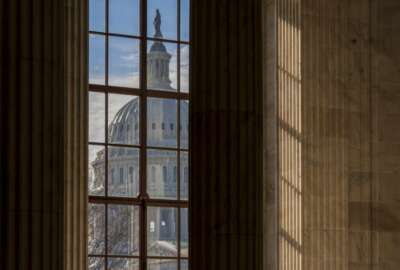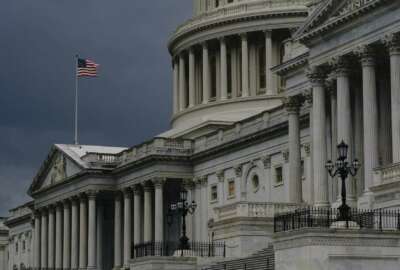
Long lasting complications from the 2013, 2018 government shutdowns
Federal employment attorney Heidi Burakiewicz represents tens of thousands of employees who sued for damages after both the 2013 and 2018 shutdowns, and...
Best listening experience is on Chrome, Firefox or Safari. Subscribe to Federal Drive’s daily audio interviews on Apple Podcasts or PodcastOne.
Congress averted a government shutdown yesterday. And that’s a very good thing, obviously for a lot of reasons, but one of them is shutdowns can cause problems that drag out literally for years. Look no further than the employee pay issues surrounding the 2013 and 2018 shutdowns which are still being litigated in court. Federal employee plaintiffs who worked without pay during those shutdowns argue they’re owed damages under the Fair Labor Standards Act. The government argues that’s wrong, because under the Anti-deficiency Act, it would have been illegal to pay them during the shutdown. Lawyers are now filing briefs before the Court of Appeals for the Federal Circuit, which is expected to sort out the apparent conflict between those two statutes very soon. Federal employment attorney Heidi Burakiewicz represents tens of thousands of employees who sued for damages after both the 2013 and 2018 shutdowns. And she joined Federal Drive with Tom Temin to bring us up to speed on those cases.
Interview transcript:
Jared Serbu: Thanks, Heidi, for joining us. And yeah, let’s start by just talking about where things stand with both of those cases, because we have been talking about these lawsuits for a very long time now.
Heidi Burakiewicz: Both cases have been – the government has appealed both cases to the Federal Circuit Court of Appeals, which is the court that has appellate authority over the court of federal claims. And we are looking forward to getting a decision from the appeals court. We feel very strong about our position that the government violated the FLSA and owes liquidated damages to the essential workers who had to go to work and were not paid on their regularly scheduled pay day.
Jared Serbu: And you’ll correct me on this, but I think really the core legal issue the court needs to decide here is whether the Anti-deficiency Act truly prevented the government from making those payments during a shutdown and the liquidated payments after the shutdown. Is that a fair summation?
Heidi Burakiewicz: Yes, that’s correct.
Jared Serbu: And so give me your argument for for why the Anti-deficiency Act doesn’t obviate the need for these payments.
Heidi Burakiewicz: Sure. So the anti deficiency act prevents government officials from expending funds that haven’t been authorized or appropriated by Congress. But it doesn’t negate the government’s obligation. Under other statutes or contract, there’s cases going back to the 1800s, where the government, sort of, even though it had a lack of appropriations was still held liable in court, it had to fulfill its obligations under different contracts that it engaged in. And the same principle applies here – the Fair Labor Standards Act, it’s a Depression-era law that sets the basic minimum requirements for paying employees in this country, that you pay someone a minimum wage for all hours worked, and full-time-and-a-half overtime when you work over 40 hours a week. And the Anti-deficiency Act does not negate the obligations that the government has under the Fair Labor Standards Act. And so as a result, because they did not pay these employees every time a payday came and went and employees did not receive the pay that they had worked for and earned, that’s a violation of the Fair Labor Standards Act. And the result is that the government owes these employees liquidated damages.
Jared Serbu: “Liquidated damages” in this context, meaning just double pay, right?
Heidi Burakiewicz: Yes, it’s the value of the unpaid minimum wage, plus the full value of overtime that was worked.
Jared Serbu: One thing that has happened since even the 2018 shutdown was Congress came back and passed a law in 2019. Essentially ensuring that any government employee who suffered through a shutdown would get back pay. Does that change the legal landscape in your mind as far as the FLSA is concerned?
Heidi Burakiewicz: Absolutely not. Again, every time that a payday comes and goes and an employee is not receiving their pay, it’s a violation of the Fair Labor Standards Act. So even if the government is compensating employees, after the fact or retroactively, the violation of the law has already taken place. And the employees have been harmed. There are countless stories of people – I mean, the last shutdown lasted 35 days. And it wasn’t clear up until the very end, when it was going to end. There were countless stories of people who, we’re running out of money, how to make really tough decisions about whether they pay their rent, or they feed their kids, or they pay for public transportation to get to and from work, because they weren’t – four weeks they were not paid. So I’m glad that federal workers will be insured retroactive payment, but that doesn’t change the fact that the FLSA was violated.
Jared Serbu: But there’s no disagreement, right, that the government would be legally prohibited from making payments to these employees during a shutdown, right?
Heidi Burakiewicz: Well, there’s actions that Congress could take, even in a lapse of appropriations to fulfill its obligations under the Fair Labor Standards Act. So for example, in 2013, the Department of Defense was one of the agencies that did not have funding during that government shutdown. And Congress passed the Pay Our Military Act, so that active duty military and the civilians who support the military would continue to get paid during the shutdown. If Congress can do that, for the military, there’s no reason that they can’t do that for the essential workers who still have to go to work during a lapse of appropriations. If these people are so vital, that our country can’t function without them, then absolutely steps can be taken to make sure that they’re paid and they’re taken care of during another lapse in appropriations.
Jared Serbu: Besides arguing that that they really have no choice but to not pay these employees, I think another one of the government’s arguments here is that the Fair Labor Standards Act doesn’t explicitly address the date that these payments have to be made. I assume you disagree with that, if that assumptions, right, tell me why.
Heidi Burakiewicz: Absolutely, I very much so disagree with that argument. It’s very clear, court precedents and the statute itself, a violation of the statute of the Fair Labor Standards Act takes place – you look at the statute of limitations. When does the claim accrue? The claim accrues on the employee’s regularly scheduled payday. So for example, if an employer is paying an employee on time, but only paying them a portion of the wages that they’re due under the Fair Labor Standards Act, that violation takes place on the day that payment is made to the employee. And similarly, a violation takes place if the pay day comes and goes, and the employee is not paid at all. And if you look at the legislative history, it’s very clear that it’s important that employees are paid on time just as a business needs to know when its income is coming in. So does an employee, so that they can pay their rent, pay their bills, budgets or expenses.
Jared Serbu: For individual employees, this is obviously a fairness issue. They if they’re entitled to back pay and liquidated damages, they should get back pay and liquidated damages. Is there also a public policy argument in play here? Is there any argument that applying liquidated damages in situations like this would impose any kind of deterrent effect on Congress to avoid future shutdowns or future lapses in pay?
Heidi Burakiewicz: Well, I want to preface my answer by saying that the liquidated damages provision of the FLSA is not meant to be punitive. It’s there because there’s a recognition by Congress that when you don’t pay an employee, those minimum wages, that overtime we know that they’re due on their regularly scheduled payday, that they’re going to be harmed. And sometimes that harm is hard to calculate. Perhaps you have interest charges, late payment penalties? Not to mention the stress and trauma that people went through not knowing when they would get their next paycheck. So the liquidated damages provision is meant to compensate employees for the harm they suffered. It’s not meant to be punitive. That said, I can certainly say for all of the clients that I represent, we want nothing more than to send the message that the federal government just cannot treat the federal workforce like this. We wouldn’t stand by if a private employer did it. And the federal government’s no different. So we hope that there is no further shutdowns, no more budget impasses. But if there is we hope that they take common sense measures to make sure that the FLSA is complied with and employees are taken care of.
Jared Serbu: Going back to where we started, a lot of employees involved here going all the way back to the 2013 shutdown, we now have two cases going up to the Federal Circuit. If these go your way, and they decide that the Federal Labor Standards Act does apply liquidated damages need to be paid. What’s the soonest practical timeline on which your clients could actually get this back, get these liquidated damages?
Heidi Burakiewicz: Well, in the 2013 case, the government has calculated damages for all of the plaintiffs in the case. So that we would hope and expect would be a very quick process. Because the damages have been calculated. The damages have not been calculated for the 35 day government shutdown that took place in December 2018 to January 2019. But we’ve laid the groundwork based on the litigation in the 2013 case, we’ve went through the process of the government gathering the electronic information that it needs to calculate damages, person by person, we’ve agreed on the formula to use and we’ve laid that groundwork so I’m optimistic that the damage calculations process in the 35-day government shutdown case will go much faster.
Jared Serbu: Yeah, I was just gonna ask about that. And you’ve answered it and do you have any insight into why that process for the 2013 case dragged out so long in terms of figuring out what the damages would be? I mean, isn’t it just a matter of multiplying by two for the back pay that you’ve already issued?
Heidi Burakiewicz: Well, litigation is never fast, and the government – it was quite the process to gather all of the information that they needed to calculate damages for 25- 26,000 plaintiffs that had joined the case, and the formula was a little bit more we went back and forth several times about it, but finally agreed on what that formula should be. So again, I am optimistic that we laid the groundwork, we know what the formula is, we know what the process is to get the information that we need to do the damage calculations. And the next time the 35-day government shutdown case will go faster.
Copyright © 2025 Federal News Network. All rights reserved. This website is not intended for users located within the European Economic Area.
Tom Temin is host of the Federal Drive and has been providing insight on federal technology and management issues for more than 30 years.
Follow @tteminWFED
Related Stories

With judge’s recent decision, employees can pursue long fight for 2018 shutdown pay




